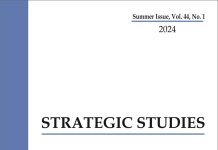Abstract
After the 2013 elections, the Government of Pakistan (GoP) stepped up its efforts to combat the energy crisis, persisting in the country. Due to limited energy resources and poor infrastructure, Pakistan looked towards resource-rich countries to secure energy supplies. On the other hand, the Central Asian Republics (CARs) have an abundance of energy resources and are looking for the markets to export their surplus energy resources. The Central Asia South Asia-1000 (CASA-1000), Turkmenistan-Afghanistan-Pakistan-India pipeline (TAPI) and Turkmenistan-Uzbekistan-Tajikistan-Afghanistan-Pakistan (TUTAP) electricity project have been launched. The development work on these projects is already underway. These projects are an attempt to promote development. through cooperation. However, there are many obstacles that could impede energy transfer to Pakistan. This paper attempts to examine the impact of these projects on Pakistan’s economic development. It also analyses the measures that have been taken to address the challenges and present some recommendations for ensuring efficient delivery of these projects.













